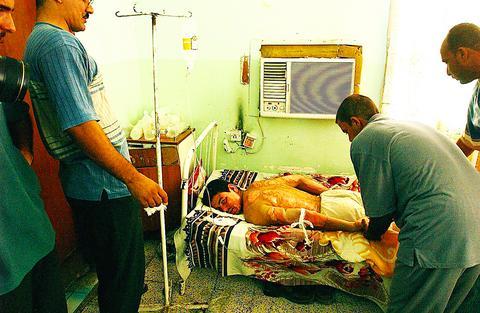Insurgents killed seven Iraqi security personnel in a car bombing and other attacks, and the US military announced the deaths of six Americans, including four killed by guerrillas.
The American dead included two soldiers killed by a roadside bomb on Tuesday and two Marines who died after being wounded in fighting the day before. Two others died in non-combat-related incidents. The US deaths brought the number of US service members who have died since the beginning of military operations in Iraq to at least 919.

PHOTO: EPA
Also Tuesday, saboteurs set off a bomb at a key northern oil pipeline, sparking a fire and sending huge plumes of thick black smoke into the sky. The explosion had no immediate effect on exports, which had been halted for weeks from the north.
Iraqi Prime Minister Ayad Allawi blamed the continuing violence on "evil powers ... trying to stop Iraq's march toward safety."
"We expect that as Iraq's [security] capabilities increase, the crushing of these [armed] operations will increase,'' he said Tuesday.
In the city of Najaf, south of Baghdad, forces loyal to radical Shiite cleric Muqtada al-Sadr were holding 18 police hostage as leverage to force authorities to release their comrades, a police official said Tuesday on condition of anonymity.
The abductions reflected increasing friction that has threatened a fragile truce that ended two months of fighting that began in April between al-Sadr's Mahdi Army militia and US troops. Marines and al-Sadr's militiamen engaged in a battle in Najaf on Monday that killed a woman.
Al-Sadr aides have accused police of targeting members of his Mahdi Army.
Najaf Governor Adnan al-Zurufi confirmed that a number of policemen were kidnapped; Ahmed al-Shaibany, an al-Sadr spokesman, denied any police were locked up in al-Sadr's office or any of his quarters.
The deadliest insurgent attack on Tuesday came in a car bombing north of the city of Baqoubah, when a truck raced toward an Iraqi checkpoint guarding Kharnabad Bridge, officials said.
The truck attempted to merge into a US military convoy heading toward the bridge, but a soldier driving one of the vehicles forced it off the road before it detonated, said Major Neal O'Brien, a US Army spokesman. No US troops were injured, he said.
The blast killed four members of the Iraqi National Guard and wounded five others, said Major-General Waleed Khaled Abdulsalam, Baqouba's police chief.
"A US convoy drove past us and just afterward there was an explosion,'" Corporal Motaz Abood, whose back, arms and face were covered in burns, said from his hospital bed.
In other violence, a roadside bomb attack early Tuesday killed Colonel Mouyad Mohammed Bashar, chief of al-Mamoun police station in Baghdad, along with another officer, officials said. A third officer was wounded in the blast.
Gunmen in the northern city of Mosul opened fire on a police station, killing one officer and injuring two others before fleeing, police chief Izzat Ibrahim said.
The pipeline attack came when saboteurs exploded a bomb on Tuesday alongside a pipeline that sends oil to Iraq's Beiji refinery as well as to Turkish port of Ceyhan, the main export line from Iraq's northern oil fields. The Ceyhan pipeline already has been idle for weeks due to constant attacks.

PRECARIOUS RELATIONS: Commentators in Saudi Arabia accuse the UAE of growing too bold, backing forces at odds with Saudi interests in various conflicts A Saudi Arabian media campaign targeting the United Arab Emirates (UAE) has deepened the Gulf’s worst row in years, stoking fears of a damaging fall-out in the financial heart of the Middle East. Fiery accusations of rights abuses and betrayal have circulated for weeks in state-run and social media after a brief conflict in Yemen, where Saudi airstrikes quelled an offensive by UAE-backed separatists. The United Arab Emirates is “investing in chaos and supporting secessionists” from Libya to Yemen and the Horn of Africa, Saudi Arabia’s al-Ekhbariya TV charged in a report this week. Such invective has been unheard of

US President Donald Trump on Saturday warned Canada that if it concludes a trade deal with China, he would impose a 100 percent tariff on all goods coming over the border. Relations between the US and its northern neighbor have been rocky since Trump returned to the White House a year ago, with spats over trade and Canadian Prime Minister Mark Carney decrying a “rupture” in the US-led global order. During a visit to Beijing earlier this month, Carney hailed a “new strategic partnership” with China that resulted in a “preliminary, but landmark trade agreement” to reduce tariffs — but

Chinese President Xi Jinping’s (習近平) purge of his most senior general is driven by his effort to both secure “total control” of his military and root out corruption, US Ambassador to China David Perdue said told Bloomberg Television yesterday. The probe into Zhang Youxia (張又俠), Xi’s second-in-command, announced over the weekend, is a “major development,” Perdue said, citing the family connections the vice chair of China’s apex military commission has with Xi. Chinese authorities said Zhang was being investigated for suspected serious discipline and law violations, without disclosing further details. “I take him at his word that there’s a corruption effort under

China executed 11 people linked to Myanmar criminal gangs, including “key members” of telecom scam operations, state media reported yesterday, as Beijing toughens its response to the sprawling, transnational industry. Fraud compounds where scammers lure Internet users into fake romantic relationships and cryptocurrency investments have flourished across Southeast Asia, including in Myanmar. Initially largely targeting Chinese speakers, the criminal groups behind the compounds have expanded operations into multiple languages to steal from victims around the world. Those conducting the scams are sometimes willing con artists, and other times trafficked foreign nationals forced to work. In the past few years, Beijing has stepped up cooperation